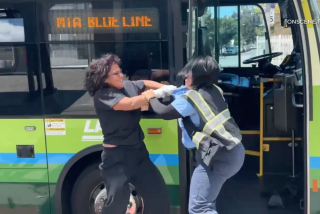Building a Business in a Neighborhood Most Firms Shun
- Share via
CHICAGO — Idle men in this West Side neighborhood sit on the front stoops, next to boarded-up buildings and sidewalks that have surrendered to gravel and weeds.
In a place where 20% of the people are out of work and the Census Bureau says the median household income is less than $11,000, most might see despair and neglect. Rachel Hubka sees opportunity.
For eight years, she has based her Rachel’s Bus Co. here, looking past the corner drug dealers and abandoned buildings toward a possible new future for the neighborhood, one she wants to help build.
Her company, which has more than $4 million in annual revenues ferries 2,000 public school children to and from classes each day during the school year and charters trips for church groups and other organizations in the summer.
In choosing the North Lawndale neighborhood, Hubka gets cheap rent, easy access to Chicago’s expressways and eager--though often inexperienced--workers. Many of the company’s 140 part-time drivers are blacks and Latinos who have lived in homeless shelters.
“You can find good workers anywhere you want to go,” said Hubka, who has met with President Clinton to talk about helping welfare recipients get jobs.
Advocates for the poor say crime rates and poverty would decline if more companies followed Hubka’s example and gave opportunities to inner-city residents.
Few businesses, however, will take a chance on poorly spoken, uneducated neighbors with imperfect job records. In contrast, Hubka recruits the destitute, often sending employees to visit neighborhood events and Public Aid offices.
“My personal belief is, if the people are willing to come and work, I have a training program so they can be employable,” Hubka said.
Lewis Barnes, a 47-year-old bus driver, said Hubka is one of the few business people who will give lower-skilled workers a chance.
“They are glad to tell you to come in and fill out an application, and ‘We’ll keep you on file,’ but they never get back to you,” he said. “You go home and wait for the phone to ring, and you never get a call.”
*
Sylvester McCracklin, a 53-year-old former steel mill worker with a 10th-grade education, had been out of work for a year when he applied at Rachel’s.
“It’s hard to find a job for a man of my age,” McCracklin said. “There aren’t many jobs in my neighborhood.”
As a steel mill worker, he made triple the $300 a week he earns driving buses for Hubka. But he knows his opportunities are limited.
“With technology on the rise, when you don’t have those kinds of skills, it’s kind of rough,” he said.
Hubka employs 140 part-time bus drivers during the school year and 130 in the summer. Applicants must pass a physical exam, a driver’s exam, a drug test, have no criminal record and be fingerprinted--before training even begins. Drivers take ongoing classes in defensive driving and safety awareness.
They are paid an average of $185 a week and are provided with about $600 worth of training, There are bonuses for safe driving and perfect attendance as well as paid vacations after a year.
Another 23 workers are office staff and mechanics who take care of the yellow buses. Rachel’s also provides training on proper dress for the workplace, a shuttle to and from the job and, when possible, assigns drivers to their children’s school district.
While jobs like Hubka’s will not bump poor workers into the middle class, experts say they can provide a stepping stone to higher-paying positions and set a good example for children whose parents have hardly worked.
The Chicago Urban League, an advocacy group for the poor, said there are three to seven welfare recipients or unemployed people for every vacant low-skilled position in Chicago. The league said there are 62 to 114 such people statewide for each entry level job that pays more than $25,907 a year--which it deems a living wage for a single parent with two young children.
*
Hubka herself had to hustle sometimes to make ends meet. The second youngest of 13 children, she grew up on a farm near Little Rock, Ark., Her father, a carpenter and preacher, died when she was 9. Her mother was a Bible school teacher and went back to school after her children were grown to get a master’s degree in special education.
Hubka learned a solid work ethic, but finding her vocation would take time. She left Arkansas State Teachers College after only a year, then moved to Chicago when she found few opportunities in her town.
As the mother of three young children, she tried to supplement her husband’s income by doing telephone solicitations from the kitchen table. When her children started school, she worked at a number of jobs, including stints at a dry cleaner and a telemarketer, often rising quickly through the ranks.
When her marriage of 18 years fell apart, Hubka got a real estate license but found that she couldn’t earn a steady income. In 1978, she took a job as a dispatcher at a school bus company and worked her way to the top.
When she had a chance to start her own bus company, Hubka got a bank loan and forged ahead. She said she wasn’t trying to be socially conscious, just trying to do for her workers what she wishes some of her employers had done for her.
“I think there should be opportunities for anyone to take care of themselves, to build self-esteem, have hope and to set goals,” she said.
More to Read
Inside the business of entertainment
The Wide Shot brings you news, analysis and insights on everything from streaming wars to production — and what it all means for the future.
You may occasionally receive promotional content from the Los Angeles Times.










